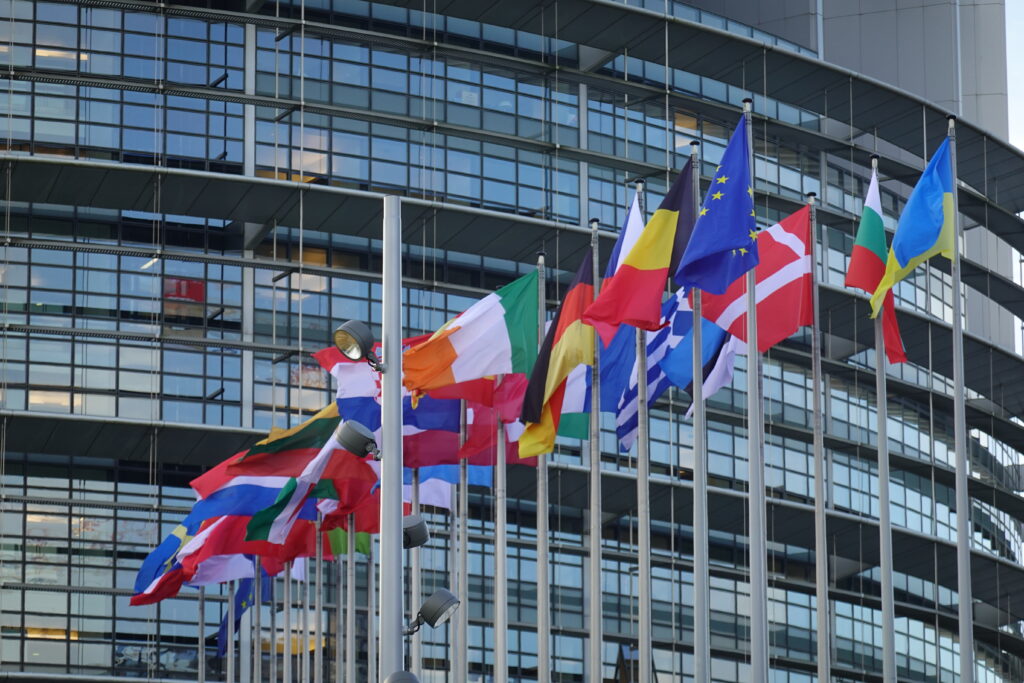The EU positions itself as a global leader in scientific collaboration, yet its actions reveal tensions between principles and pragmatism.
ISRAEL AND EU: PARTNERS IN CRIME?
Israel, the first non-European country to gain associated status in the EU’s research framework, is a key contributor in science and technology advancements.
However, the partnership is not without controversy. The current situation in Gaza brings tensions to a new level. This past year, participants of Horizon Europe urged for EU to remove Israel from projects. While protesters took to the streets, researchers wrote open letters and students occupied their university, Israel remained a collaborating partner.
There are growing apprehensions about the role EU funding may play in supporting the ongoing atrocities. Among the concerns are the use of Palestinian captives in medical research and the use of technology developed with EU funding to commit war crimes. To understand the tolerance towards Israel in EU’s projects, it is important to understand how this collaboration started:
After its 1948 statehood, EU-Israel relations advanced significantly with the 1965 Diplomatic Relations Agreement, paving the way for deeper cooperation, including the EU-Israel Association Agreement (1995) and participation in research programs like Horizon Europe.

Israel showed strong performance in EU programs, including Horizon 2020, where it was among the top non-EU participants in terms of grants secured and projects led. Which brings us to the current program: Horizon Europe. In December 2021, Israel officially signed the agreement to join Horizon Europe, ensuring its full participation in the program’s projects, funding calls, and collaborative opportunities. Israeli universities, companies, and research institutes became eligible to compete for grants and join European consortia.
Halid Kayhan, researcher at the KU Leuven, has long been raising his concerns on the involvement of Israel in Horizon Europe: ‘’We’ve raised concerns about this issue through different avenues, such as an open letter, blog posts, and communication with the EU Commission. It seems that th=e EU Commission does not share our concerns and only says that they already have mechanisms in place to address any ethical and legal concerns. However, as I have heard from others no Israeli (or any other) partner has ever been excluded by the Commission through these mechanisms. They also argue that removing Israelis based solely on nationality would be discriminatory, by disregarding the fact that our concerns are not related to the nationality, but the serious ethical and legal risks involved in their participation as well as the numerous rules under the EU and international law.’’
Marieke Saeys, member of the UAntwerp for Palestine movement, shares her perspective on the role universities, governments, and Europe should play in response to Israel’s actions:
Bombing with EU funding
A report published in March 2024 by Statewatch and IMI reveals that the EU has funded Israeli military-linked companies through research and development grants. They allocated millions of euros to Israeli entities, including the Ministry of Defence and companies like Xtend and Rafael Advanced Defense Systems, for drone and defense-related projects under Horizon Europe. Xtend, received €50,000 through the Horizon Europe program for optimizing its Skylord Xtender drone system, used to drop bombs on Gaza.
Stolen land and stolen organs
In the late 1990s, reports revealed that Israeli forensic pathologists at the Abu Kabir Institute harvested organs, including from Palestinians, without consent. In November of 2023, the Euro-Med Human Rights Monitor has called for an independent international investigation into allegations of organ theft by the Israeli army. Medical professionals in Gaza reported signs of organ theft, such as missing cochleas, corneas, and vital organs, after bodies returned from the borders with Israel.
This case worries researchers, Kayhan included: “There are also claims that organ thefts are taking place due to the lack of domestic donors among religious Israeli citizens. Additionally, there are reports of Palestinian detainees in camps like Sde Teiman Detention Camp being subjected to medical experimentation and treatments by incompetent doctors. Collaborating with Israel in healthcare raises very serious concerns “
While Israel’s actions have frequently been a subject of debate within the EU, the country has faced no sanctions despite persistent efforts from left and green parties. Any criticism of Israel is often dismissed as “antisemitism,” a narrative that leverages Europe’s guilt over the Holocaust to shield Israel from accountability.
Marieke Saeys also questions the ethical implications of these collaborations, especially as academic partnerships and international ties are frequently portrayed as pathways to progress and innovation.
HUNGARY AND THE EU: WHEN VALUES COLLIDE
While the EU strengthens its collaborations with non-EU countries like Israel, challenges in cooperation with some member states continue to emerge. Hungary’s relationship with the EU for example is very complex. “Quite important amounts of funds are blocked for Hungary. That has to do with all the issues surrounding rule of law. There are some enabling conditions, which Hungary is not yet respecting in the area of academic freedom, asylum seekers, media freedom, LGBTQ laws and so on”, says Stefan De Keersmaecker, spokesperson for Public Health at the European Commission.
To illustrate, in 2021 Hungary’s parliament approved a law prohibiting the portrayal of gay people in school materials and TV programmes aimed under the age of 18. The law was criticized by a European human rights official as ‘an affront to LGBTQ rights’ and incompatible with democratic values.
Specifically, the EU imposed a funding ban on 30 Hungarian research institutions, including 21 universities. A report by the Hungarian Young Academy shows that 40% of young researchers were negatively affected as a result. It also shows that a quarter of respondents have already started or plan to look for work abroad. However, this EU funding ban does not mean that Hungarian academics and universities cannot participate in EU projects. They can still do that, but without direct funding from the EU. “This approach reflects the complexities of dealing with an EU member state, as excluding Hungary entirely would be challenging”, Halid Kayhan explained.
Hungarian presidency of the Council of the European Union
From 1 July to 31 December 2024, Hungary holds the presidency of the Council of the EU, a role that many viewed as contradictory given the country’s ongoing clashes with the EU over democratic values. During its presidency, Hungary prioritized seven thematic areas, including strengthening the EU’s defence policy and curbing illegal migration. As Hungary’s term concludes at the end of 2024, it will pass the torch on to Poland.
POST-BREXIT: REBUILDING UK SCIENCE AND INNOVATION
Brexit was one of the most influential things in the EU in recent history. The UK’s departure had clear short- and long-term implications. One thing that quickly became clear was that it made the United Kingdom less attractive for scientific innovation and collaboration.

“It was the first time the EU lost a country”
MEP Kathleen Van Brempt
The main reason is the lack of Horizon funding. This program is one of the EU’s key funding programs for research and innovation, worth upwards of 95.5 billion euros. After the UK’s departure, it lost a lot of funding in those departments, and although it wasn’t a member of the program anymore, it sought association with Horizon. That came in the form of the EU-UK Trade and Cooperation Agreement (TCA), a free trade agreement between the parties.
Post-Brexit challenges
Zach Meyers, assistant director of the ‘Centre for European Reform’ and co-author of ‘UK science and technology after Brexit: How to Fix it’, talks about the difficulties after Brexit. “The uncertainty has been really damaging. UK policy has been very unstable since 2016. or That makes life difficult research and innovation, because it relies on long-term projects.”
Moreover, the cutback in skilled labour and the end of free movement have heavily affected the United Kingdom. “You don’t get the top-end researchers you would otherwise get, and you don’t get people doing unskilled work which would make it easier for others to upskill. On top of that, there are visa fees that form a big hurdle to increase migration of skilled labour.”
New Horizon
Since January 1st, 2024, the UK is part of Horizon again, a crucial step in the right direction in terms of funding for scientific innovation. However, it will take some time to recover the lost ground, according to Zach Meyers. “It could take four to five years before you see the UK reaching the same levels it did before 2016.”
EU’S ROLE IN SCIENCE: PRINCIPLES OR POLITICS?

While Israel participates fully in Horizon Europe despite human rights concerns, Hungary faces funding restrictions for democratic backsliding. Brexit further highlights the EU’s influence, as the UK sought reintegration into Horizon Europe post-exclusion. Despite these contradictions, the EU remains a key player in global science. Its funding and collaborative efforts enable groundbreaking research that benefits people worldwide. However, its selective enforcement of values raises concerns about double standards.
The EU’s actions suggest it struggles to balance its principles with pragmatism. As a leader in scientific collaboration, its influence is undeniable. But its inconsistencies leave room to question whether it truly leads with its values or is constrained by politics in its pursuit of progress.




